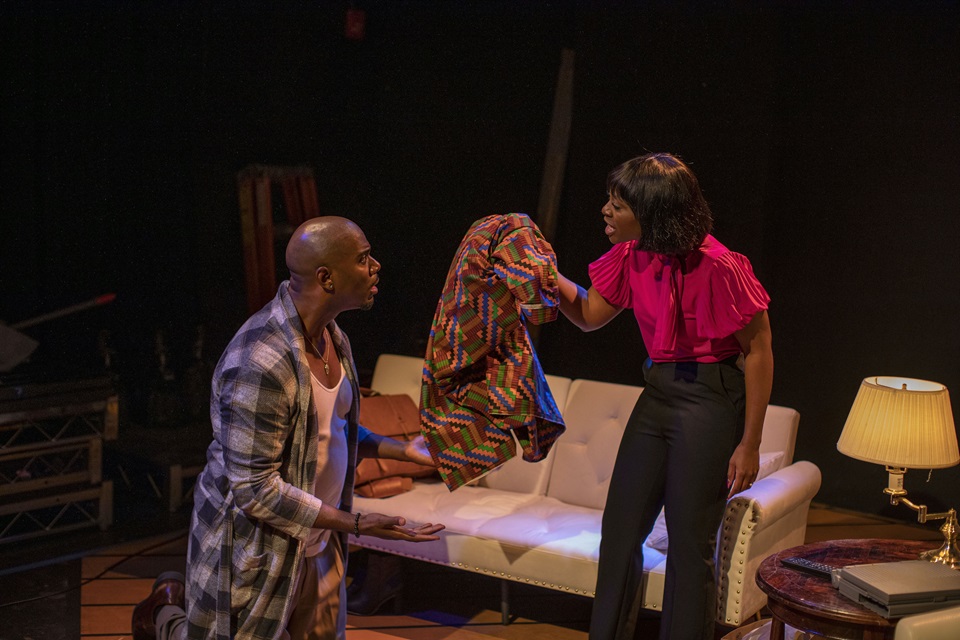
LOS ANGELES — First produced in 1989, The Talented Tenth has become a classic of Black American dramatic literature. Yet its timeliness has not faded at all, its relevance undimmed by the years. It is currently running in a fine professional production by the Robey Theatre Company, named for Paul Robeson and founded by Danny Glover and Ben Guillory, who acts in the play and also produced and directed it. Guillory, as much as or more than anyone, is the dean of African-American theater in L.A.
Readers familiar with the writings of scholar, activist, social reformer, and late-in-life Communist Party member W.E.B. DuBois, will recall the title of this play from a 1903 article in which he described the potential and necessity for one in ten Black men becoming leaders of their people by continuing their education, writing books, or becoming directly involved in social change. Over time, Du Bois deepened his understanding to recognize that critical leadership could also emerge from grassroots community and labor struggles, and of course would also include women.
And where were those leaders going to come from? That was, and to a degree continues to be, the historic charge of the HBCUs—the historically black colleges and universities—established at a time, mostly after the Civil War, when public and private institutions of higher learning were off-limits to African Americans. Howard University, in Washington, D.C., has been perhaps the most prolific of these HBCUs, supplying generations of leaders in every field to establish an African-American foothold where none existed before. Set in 1993, The Talented Tenth portrays a clutch of Howard graduates who have succeeded, as reflected by the obvious symbols—the big house, the new cars, the expensive resort vacations, the gym memberships and golf games, the accomplished families and, sometimes, the mistress on the side.

Not surprisingly, the playwright, Newark-born Richard Wesley, is a 1967 Howard graduate himself. He knows these people. And is one of them. A member of the New Lafayette Theater from 1970 through 1973, he served as managing editor of its Black Theatre magazine. He went on to write plays, films, television scripts and opera librettos, including Five, with music composed by Anthony Davis (whose opera Malcolm X has just received a long overdue, critically hailed production at the Metropolitan Opera). Five was subsequently revised, becoming The Central Park Five (with a cameo portraying the New York real estate magnate Donald Trump), performed in 2019 by the Long Beach Opera Company, and reviewed at the time here. Anthony Davis was awarded the 2020 Pulitzer Prize for music for this opera. The announcement called it “a courageous operatic work, marked by powerful vocal writing and sensitive orchestration, that skillfully transforms a notorious example of contemporary injustice into something empathetic and helpful.” The final page on Richard Wesley’s career has not yet been written, of course, but his libretto for that opera may turn out to be his crowning achievement.
Wesley is currently an Associate Professor in the Tisch School of the Arts at New York University, and is a member of the Selection Committee for the Black Film Festival of the Newark Museum. He also serves on the board of the Newark Performing Arts Corporation at Symphony Hall, and is an advisor to the Center for Black Literature at Medgar Evers University in Brooklyn, N.Y.
Ben Guillory was not born yesterday. He acknowledges, in a program note, that the class of “intellectually superior” leaders “do not always produce the kind of person who contains values and true unwavering character motivated by a clear and deep desire to serve the best interest of the people.” In other words, in the America we know, cupidity, pride, egotism, pride, colorism, classism, even criminality are accessible to everybody, from any background. It’s that borderland area that Wesley is interested in exploring.
Early on in the three-hour play (with one intermission), we meet Bernard Evans (Nic Few), an eager, aspiring candidate for the position of radio station manager, being interviewed by Griggs (Ben Guillory), the owner of a small chain of Black radio stations, who will be Bernard’s boss and mentor. Over the years, Bernard’s programming decisions, including much Black-infused music and lots of advocacy news coverage from the community and the street, have boosted the stations’ ratings and significantly increased its commercial value. He is content to be in a position where his youthful civil rights activism can find its mature voice through his work.
Bernard has a beautiful, capable wife Pam (Tiffany Coty)—lighter-skinned than he, which becomes a plot point later on—who has borne him four children over the course of their 17-year marriage. They maintain close contact with their old Howard classmates, taking vacations together: In fact, the opening scene of the play has them lolling on a beach in Negril, Jamaica, where they enjoy the classy comforts of a resort hotel without risking any forays into the interior of the country. Bernard still has bigger plans for the Black radio stations that would further serve and uplift his community. But a sense of adventure, of his cresting manhood and social position, of boredom and anxiety over his mid-life existence, leads him to secretly take on a bright “woman of substance,” the sexy, darker-skinned younger Tanya (Jessica Obilom) as his mistress, who increasingly places demands on him—for a ring.

Bernard feels more conflict about betraying his original radical principles and giving in to Griggs’s dictum that “money begets power,” than about cheating on his wife. In particular, he remembers a dark-skinned militant woman he was once in love with, Habiba, who took her identification with Africa to the utmost by joining the Angolan independence movement, and dying in battle. Does he see Tanya as his imaginary new Habiba?
At the crux of the play is Griggs’s consideration of a lucrative offer from the white-owned media corporation Pegasus International for his chain of radio stations. Under its new ownership, Bernard would occupy a figurehead position, helpless to prevent its transition to “infotainment,” a total commercialization of the work he has created. But where would the capital come from to counter Pegasus’s offer? And how will Bernard’s complicated domestic life resolve itself?
The Talented Tenth tackles many issues, not the least of them the unspoken conflicts holding over from the old Howard days about racial hue, national identity, and what was known then as “Negritude.” Why did Pam choose Bernard, and why did he choose her? There seems barely enough time to adequately investigate all these topics, and it takes multiple scenes, each with a minute or two to reset the stage, to properly juggle this amount of information. After a while, with its many set changes, I thought, Did the playwright originally conceive of this as a movie—or that a movie could be made from the play? In that medium, the flow between scenes would be almost invisible; here it seemed, of necessity, a little clunky.

But overall, the production is modestly proportioned and certainly holds a playgoer’s attention. The acting is superb, helmed as it is by Mr. Guillory. Also appearing in it are Julio Hanson as Marvin, and Monte Escalante as his wife Rowena, Stirling Bradley as another Howard classmate Ron who has dreams of striking it rich in today’s Africa, and Rogelio Douglas III as a Young Man.
Ed Haynes is responsible for the production design, and Cydney Wayne Davis for the music. James Manning is the sound engineer, Jason Mimms the graphic designer, Naila Aladdin Sanders the costume designer, Benedict Conran the lighting designer, and Rye Mandel the prop master.
The Robey Theatre Company’s The Talented Tenth plays through Dec. 10 at the Los Angeles Theatre Center, 514 S. Spring St., Los Angeles 90013, with performances Thurs. through Sat. at 8:00 p.m. and Sun. at 3:00 p.m. Q&A’s will follow Sunday performances. Tickets are available through the Robey website.
We hope you appreciated this article. At People’s World, we believe news and information should be free and accessible to all, but we need your help. Our journalism is free of corporate influence and paywalls because we are totally reader-supported. Only you, our readers and supporters, make this possible. If you enjoy reading People’s World and the stories we bring you, please support our work by donating or becoming a monthly sustainer today. Thank you!












Comments